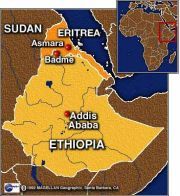Eritrea accuses Ethiopia of “duplicity” as border conflict rises
20 October 2005 (ASMARA) — Eritrean government on Thursday accused arch-foe Ethiopia of “duplicity” for complaining about alleged Eritrean violations of a 2000 peace deal as tensions over their common border soared amid fears of new conflict.
 Yemane Gebremeskel, director of Eritrean President Isaias Afwerki’s office, dismissed Ethiopian Prime Minister Meles Zenawi’s assertion that Asmara had violated the Algiers pact by banning helicopter flights by UN peacekeepers.
Yemane Gebremeskel, director of Eritrean President Isaias Afwerki’s office, dismissed Ethiopian Prime Minister Meles Zenawi’s assertion that Asmara had violated the Algiers pact by banning helicopter flights by UN peacekeepers.
“If he is serious, it is an extreme case of duplicity,” he said in the first comments by a senior Eritrean official to foreign media since the ban took effect earlier this month.
“How can the prime minister now evoke an agreement that he has nullified, violated?” Yemane asked, re-stating Eritrea’s position that Ethiopia has breached the deal by refusing to accept a binding border delineation.
“Ethiopia is occupying sovereign Eritrean territories in violation of the Algiers agreement, of the UN Charter, of express Security Council resolutions,” he told a pair of reporters, including an AFP correspondent, in his Asmara office.
“This is not a border dispute anymore, but an occupation of sovereign Eritrean territories,” Yemane said. “Eritrea has showed maximum patience, maximum restraint so far.”
Earlier this week, Meles said Ethiopia was concerned about the helicopter ban as well as an alleged Eritrean build-up of irregular forces in a de-militarized buffer zone along Eritrea’s side of the border.
Yemane denied that the helicopter ban, which has forced the UN Mission in Ethiopia and Eritrea (UNMEE) to withdraw from nearly half its observation posts in the buffer zone, was a violation of the peace deal.
“No,” he replied flatly when asked if the move violated the agreement. “People are focusing on the helicopter issue, that’s a non-issue.”
Yemane refused to comment further on the ban that has drawn rebukes from the UN Security Council and UN chief Kofi Annan as well as Meles.
UNMEE, which has 3,293 military personnel in the border area, said this week the ban had left it unable to operate in nearly 60 percent of the area it is supposed to monitor along the 1,000-kilometer (600-mile) frontier.
Asmara has yet to give an official explanation for the ban or for new restrictions slapped on UNMEE ground patrols that UN officials say have made it impossible for them to report with certainty about activity in the zone.
But Eritrea has repeatedly warned new conflict is looming because of Ethiopia’s refusal to accept the 2002 border delineation made by an international panel set up as part of the pact that ended the bloody 1998-2000 war.
Diplomats believe Eritrea may have imposed the helicopter ban to put more pressure on the international community to force Ethiopia to accept the boundary decision.
Yemane said Thursday that the failure of “major powers” to press Ethiopia on the matter remained a serious problem for Eritrea.
“The problem lies also, as we have said all along, on the major powers because they continue to pamper Ethiopia,” he said.
Yemane also suggested Meles had ulterior domestic motives for raising his complaints at a time when the Ethiopian opposition is still bitterly disputing the results of May elections it says were stolen by the prime minister’s party.
“Statements coming out from Ethiopia are also designed to divert from domestic problems in Ethiopia,” he said.
“It is not the affair of Eritrea, but we see the prime minister has rigged the elections and is accusing the real winners of the election of foul play,” Yemane said, referring to Meles’ claims that the opposition is trying to foment a coup.
(AFP/ST)
